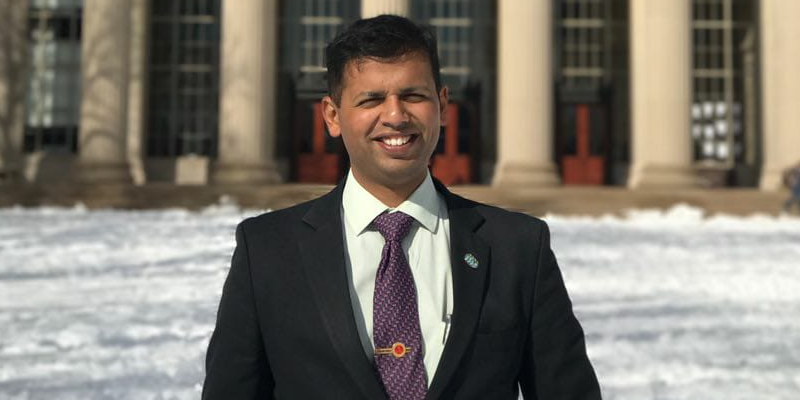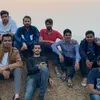People may think of social entrepreneurs as people who make an impact in the real world. However, they make an impact in the digital world as well.
Vineet Kumar, a social entrepreneur and social activist with 18 years of extensive work experience in the field of cyber peace, cybersecurity, and internet governance, believes the social impact will happen with digital technologies.
As the Founder and President of the Cyber Peace Foundation and Chairman of the National Anti-Hacking Group (NAG), he is working with the United Nations and the several international governments to create a common platform on which stakeholders in the digital era can usher in cyber peace and take on cybercrimes.
His job begins with policy and then empathises with the impact of technology on citizens.
Vineet was also the Chief Technology Officer and Head of the Cyber Defense and Research Centre, Government of Jharkhand, and was part of several advisory committees set up by UN agencies and the Government of India. He is also on the advisory board of Public Interest Registry (PIR), USA.
Being a recipient of eight international, 18 national awards, and 13 state awards, and honours for promoting cyber peace. Vineet believes in a multi-stakeholder world to fight cybercrime and handles international cyber conflict issues.

Here are the excerpts for the interview:
YS. How did this crusade for cyber peace begin?
Vineet Kumar: When I was in the fifth or sixth grade, I wanted to be a social entrepreneur. Luckily, I saw computers at a very early age and that provided me with early exposure to the internet. There was no startup culture in Ranchi twenty years ago, and everything revolved around becoming an engineer or doctor.
That’s when I entered forums about hacking and found it fascinating. In 1997, I decided then that I wanted to start a career in anti-hacking. Everyone thought that I was a fool, but my parents supported me in my journey.
Imagine in a world without Google; you had to find the right connections at several forums. I found my way to a few hackers and in that journey, I met a blackhat – a hacker who steals and destroys information, and he showed me how my own PC could be hacked for information.
Thankfully, he did not damage my dad’s computer. However, the hacker mentored me for a while and that’s how I realised the internet can be used for both good and bad.
I began R&D on cybersecurity, took a lot of certification programmes in programming. I began to advocate for social good in cyberspace and that’s how it began in the year 2000. Back then, cybercrimes were unheard of in India, and I set up the anti-hacking group to inform government and other stakeholders about the need to look at cyber peace. It was not until 2003 that cyber attacks became real in India.
Our country and Pakistan had unleashed a cyberwar. Around 99 percent of the Indian websites at the time were vulnerable to attacks. So, we started awareness programmes to inform companies and individuals about security. Today, 17 years later, government and corporates speak to us about cybersecurity frameworks.
YS. What is cyber peace?
VK: Cyber peace means that the internet should be a safe and secure place for everyone. We became the collaborative platform for stakeholders – which include citizens, institutions (both public and private), startups, and corporate.
Most importantly, the government began to recognise my work and I also won a UN award in 2008. The moment our work started getting recognised, the government of Jharkhand made me their cybersecurity expert.
Jharkhand was one of the early states to set up the cyber defence and research centre. Our organisation is aligned to build a peaceful cyberspace.
YS. What does the foundation intend to do?
VK: IAMAI predicts that in 2021, there will be one billion Indians connected to the internet. That’s a staggering number!
Everyone today is using technology and they cannot escape cybersecurity. You have to remember that cyberspace belongs to everyone and not a nation or a corporate.
In that scenario, each of the stakeholders must be represented and must jointly work together to fight cyber crime. We consult with everyone to ensure that their use of cyberspace is free from attacks.
YS. What does it mean to different stakeholders?
VK: Citizens call us over stolen information. Let me go back a step, the government will provide smartphones to several people at the bottom of the pyramid. When this happens, what is going to happen to first-time users?
There can be fake callers and people can steal information. Even WiFi hotspots in rural regions can be hacked. There can be blackmail and abuse of the public through cyber crimes. We work on several awareness programmes for startups and SMBs too.
YS. How are governments looking at this?
VK: The Prime Minister is very clear that we need to have stronger cybersecurity laws and look at the problems holistically.
The government has to involve several stakeholders before a policy is created. The problem is different law enforcement agencies have to work with each other globally to address cybercrimes.
What if India wants to catch a cyber criminal and the nation where the perpetrator is located cannot be caught? A law enforcement agency in India takes more than half-a-year to get access to data from foreign countries.
The international cyber law must also be strengthened. The data protection act is yet to be out. The government will have a new version of the IT Act, which was last amended in 2008. The new amendment must take account of things like IoT, autonomous vehicles, AI, and AR/VR.
The government is working in this area. However we need to have a strategy over our laws, we need to define the roles of each stakeholder and aggregators of data. The government has to constantly look at the ground problems and use data to make laws that protect every stakeholder.
YS. What is the future of cybersecurity and the Cyber Peace Foundation?
VK: Cyberspace is not about the negatives. It is always used for good. Cyberspace will make human life inclusive rather than displacing people.
We are taking baby steps and we will ensure that it has a maximum impact. Startups and SMBs need to take cybersecurity seriously and we are here to help them and share resources to create their cybersecurity framework.
The Cyber Peace Foundation will work with stakeholders globally, and ensure that the world collaborates. We also organised a global cyber peace challenge in 2017, which has various individuals with ideas to come together and solve cyber peace challenges such as disinformation, fake news, and data theft.
This year, we have the Cyber Strategy Challenge, where we will invite policymakers to talk about scenarios where diplomats should get involved and address cyber issues.
We will be setting up Centre of Excellence across the country and we will look at everything from smart devices, connected cars, and IoT. The COE will create an ecosystem of partnerships and we are going to do this globally.
Edited by Kanishk Singh
Link : https://yourstory.com/2020/12/cyber-space-foundation-vineet-kumar-secure-digital-era
Author :- Vishal Krishna ( )
December 08, 2020 at 08:24PM
YourStory



